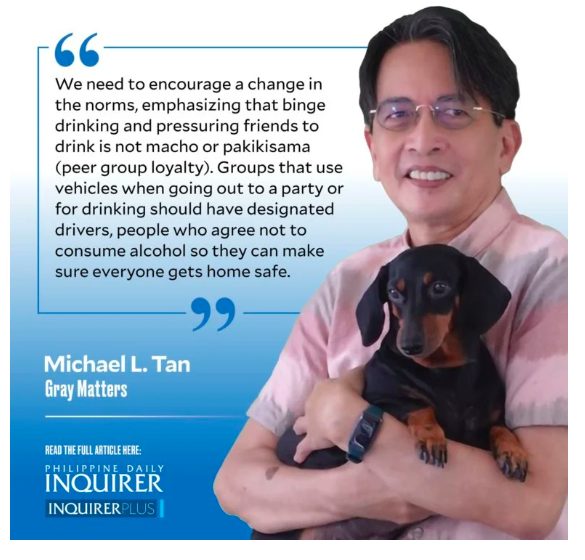Driving under the influence

Last weekend, right before New Year’s, I received news about an acquaintance who ran over and killed someone on the highway in Tagaytay at 2 o’clock in the morning. He was DUI, driving under the influence of alcohol, having come from one of those year-end parties. The victim, totally unrelated to the driver, was also drunk, walking along the highway.
It was a brutal reminder of the problem of DUI, one which plagues countries throughout the world. In the US, for example, the death toll of deaths caused by DUI is about 10,000 annually.
In developed countries, the incidence of DUI-related injuries and deaths has been decreasing because of stricter legislation and enforcement of the laws, as well as public preventive education based on research that analyzes the patterns of DUI—who is involved (young adults, more males than females), when it happens (holidays and weekends, and at night). The definitions of DUI (also sometimes called operating under influence or OUI, and DWI or driving while intoxicated) have also been expanded to include illegal drugs and even legal prescription medicines that affect mental alertness.
In developing countries like the Philippines, we don’t even know what the actual situation is because of the lack of statistics, and the fact that many vehicular mishaps, even fatal ones, are settled out of court.
No, we don’t need another law—we passed an Anti-Drunk and Drugged Driving Act of 2013, one which I wasn’t even aware of the law until I had to research for today’s column.
There is practically no public awareness or education around DUI, except for very rare “Don’t drink and drive” media reminders and quickie messages after liquor ads. Worse, our cultural norms actually encourage drunk driving. At parties, the men, young ones especially, are pressured to binge drink. Outside of parties, there are the after-work or after-school rituals of inuman (drinking alcohol).
Yes, it seems worse with East Asian cultures. Just watch Japanese, South Korean, and to some extent, Chinese drama shows with all the drinking scenes. In Japan, it has become even mandatory to join office mates for nomikai, binge drinking after work, sometimes with a superior who might use the drinking for work-related “nomicommunication” (drinking and discussing office matters).
We also know drama shows have many scenes of drinking related to romantic problems, especially heartbreak.
But note that when these K-drama and J-drama characters go out to drink, and when they need to get home while drunk, they often use public transport, even attempting WUI (walking under influence). There are even scenes of people carrying home their drunk friends piggyback, usually a boyfriend making up with a girlfriend!
We need to encourage a change in the norms, emphasizing that binge drinking and pressuring friends to drink is not macho or pakikisama (peer group loyalty). Groups that use vehicles when going out to a party or for drinking should have designated drivers, people who agree not to consume alcohol so they can make sure everyone gets home safe.
Schools should talk about these issues, including how to tell if someone is intoxicated. In the Philippines, when a motorist is apprehended and suspected to be intoxicated, they may be asked to take three “field tests”—an eye test which checks if the eyes are responding quickly to stimuli, a walk and turn test where someone has to take eight to nine steps heel to toe on a straight line, and turn around, and standing on one leg for 30 seconds, while the other leg is raised 6 inches from the ground.
Use a taxi or riding apps like Grab to get inebriated friends back home. Or, provide for a drunk friend to stay over. (Use your better judgment as to whether you trust the person asking you to stay over … especially if he or she is intoxicated as well.)
Avoid the temptation to use fear-mongering as a deterrent to DUI, especially for parents with teenage children, but I think it’s far more effective to cite experiences like the tragedy of the acquaintance who killed someone last weekend to emphasize the long-term consequences of DUI to the person injured or killed, and the family left behind. The driver, too, will bear lifelong scars for that one instance of neglect and recklessness.
Disclaimer: The comments uploaded on this site do not necessarily represent or reflect the views of management and owner of Cebudailynews. We reserve the right to exclude comments that we deem to be inconsistent with our editorial standards.
